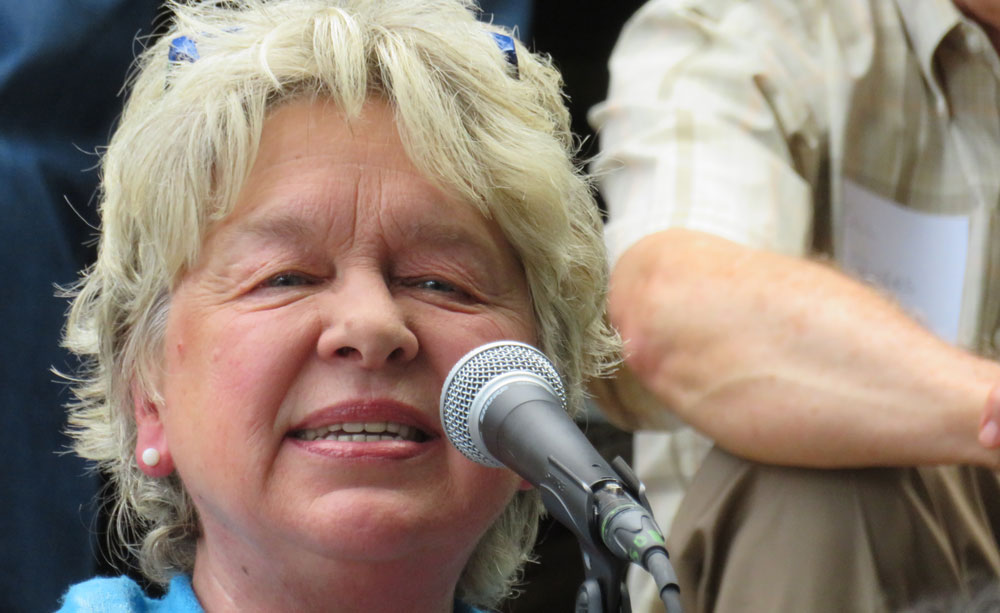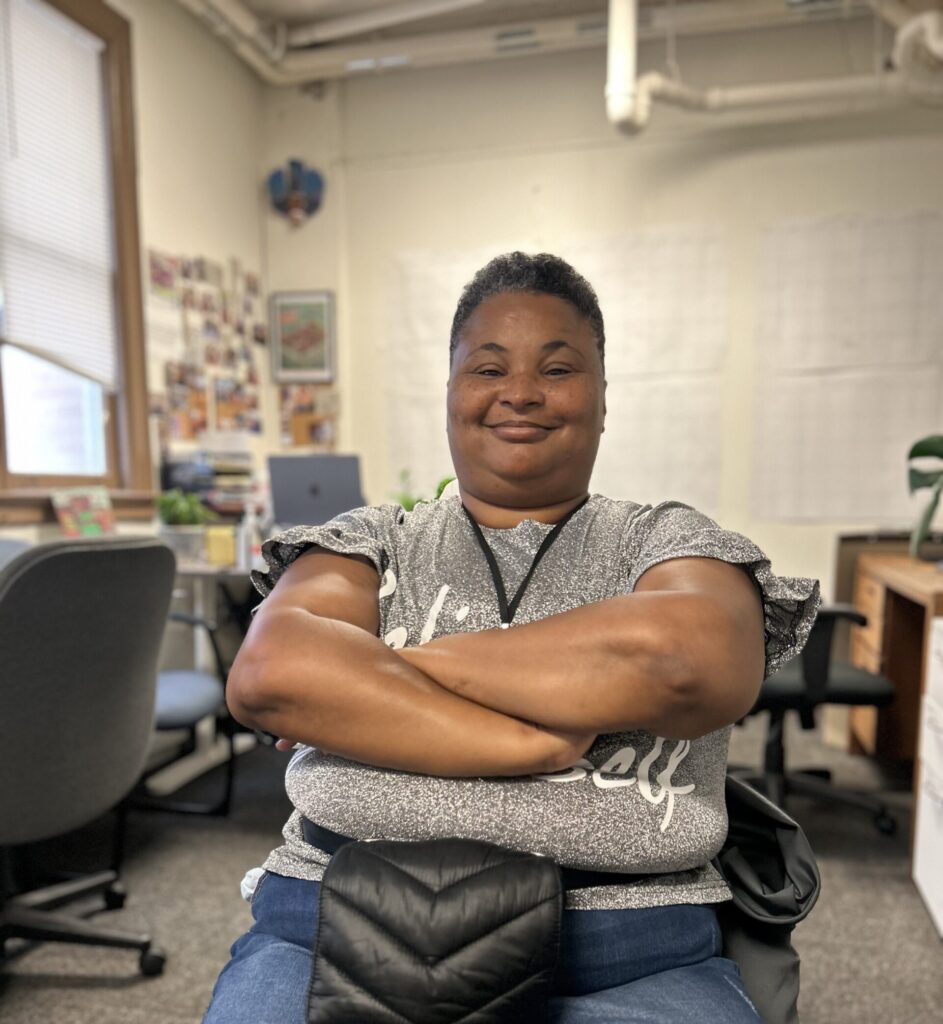When Patty Wudel first arrived at Joseph’s House nearly 30 years ago, she relished the warmth and love she felt from the people who immediately welcomed her into their community.
As she prepares to leave her longtime post as executive director of the D.C. nonprofit, Wudel explains that Joseph’s House — a home for men and women with HIV and AIDS as well as cancer — has always been a place where residents, staff, and volunteers feel like family.
She first came to know Joseph’s House in 1990 after a man named Ron, who attended the same Sunday morning church service she did at Christ House — a 24-hour medical facility in Adams Morgan for people experiencing homelessness — asked if she would like to meet his family. While Wudel thought Ron might take her down the street to a McDonald’s to meet his wife and children, she said he led her to a nearby house tucked away on the corner of Ontario Road and Lanier Place NW: Joseph’s House.
[Read more: Small health clinic Christ House delivers massive results]
Wudel said Ron ushered her inside where the smell of coffee, bacon, and eggs wafted toward them. The dining room was full of all different kinds of people — some of whom looked healthy and some of whom did not.
She remembers seeing one man who was very skinny and in a wheelchair. Sitting next to him was a man who was feeding him in a way that did not “diminish” him and instead “honored” and “respected” him.
“I sat down and I thought to myself, ‘Wow, I’ve been waiting to get to this table all my life,’” Wudel said in a recent interview.

She still recalls what Ron told her after they ate breakfast with the group: “I don’t know if you know where you are, but this place is called Joseph’s House. It’s a home for men who are homeless and have AIDS and I live here.”
“The way he said that, I fell in love with the mission of Joseph’s House forever because what was in his voice was pride and warmth and welcome and belonging,” Wudel said.
She returned to Joseph’s House the very next day and started making frequent visits. Soon, a nurse who lived in the house asked Wudel to move in and help her keep the community “knitted together.” In 1998 — about eight years after her arrival — Wudel became executive director.
Later this month, she’ll leave the position to be with her mother in Canada. A large community gathering in early June celebrated her legacy at Joseph’s House with live music from the group Recovering Angels and food from vendors such as Swizzler, CapMac, and Ben & Jerry’s.
Friends and family delivered farewell messages to Wudel and blessings to the incoming executive director — Kowshara Thomas, who has been a nurse at Joseph’s House.

Combating an epidemic
Wudel started working at Joseph’s House near the height of the HIV and AIDS epidemic in the District. She said she remembers it as a “tragic” and “terrifying” time, when medications were only just becoming available in the United States and people died quickly and “unpredictably.”
Cases of HIV and AIDS were first documented in the United States in 1981, according to the U.S. Centers for Disease Control. Following its first documentation, the prevalence of HIV and AIDS in the United States continued to grow. In 2003, there were more than 1 million cases of HIV in the United States.
Medications like AZT — the first drug approved for use to fight AIDS, having been originally developed in the 1960s to fight cancer — became available starting in 1987, according to the U.S. Food and Drug Administration. It was later discovered that treatment solely with AZT could lead some patients to quickly develop a resistance to the drug. As more medications were developed, it became the standard to use combinations of various medications. Ten years later, highly active antiretroviral therapy took AZT’s place as the new treatment standard and drastically reduced the number of AIDS-related deaths.
Amid an ongoing search for a cure, efforts to improve health care surrounding HIV also continue, with the development of prevention medication for people at substantial risk of HIV infection; the availability of faster and more reliable diagnosis and screening options; and approval of generic drugs that are more affordable.

In 2017, there were 17,217 documented HIV cases in D.C., according to D.C. Appleseed’s “Ending the HIV Epidemic in DC: 2018 Progress Report,” with the number of new infections in the District down by more than 70 percent since 2005. Yet the report highlighted concern over who experienced this progress, noting disparities by age, race, sex, and gender.
[Read more: Black women face challenges in HIV awareness, prevention, and treatment]
Wudel said there’s no question that medication has vastly improved the lives of people living with HIV. She added, however, that people who are experiencing homelessness and who have a limited income are not always able to obtain medication or stick to a medication schedule. Additionally, a person experiencing homelessness doesn’t have consistent access to “ordinary things that promote health, like nutritious food, clean sheets, and a place to rest,” she said.
“It’s just a disease of poverty now,” she said. “People who are poor are worst hit by AIDS. People still come to Joseph’s House and still die of AIDS.”
Aside from the cost of the medication, other factors can also impede proper treatment for people with HIV and AIDS who are experiencing homelessness or in danger of losing their homes. Health-related absences and discrimination, for instance, can put jobs in jeopardy. In all, about half of the people who are living with HIV in the United States are at risk of becoming homeless, according to the National Coalition for the Homeless.
[Read more: Frequent Medicaid disruptions aggravate health issues for homeless people]
Despite the obstacles, Wudel said the staff at Joseph’s House is able to help most individuals with HIV become healthier so they can move out and live independently.
“That’s a beautiful thing to see a person get their health and their life together,” she said. “It’s a beautiful thing to still know that person, who wants to stay connected, who wants to stay a part of this community.”
The door is always open
Earl McMillan, a former resident of Joseph’s House who is HIV-positive, arrived about three years ago in grave condition. He said his experience there was “healing” and gave him a sense of community.
“I was sick, knocking on death’s door,” McMillan said. “It’s a miracle to be alive.”
Kurtis Lang Sr. said he arrived at Joseph’s House almost three years ago on crutches due to severe tendinitis. He said he had been living in a shelter until his physician connected him with the staff at Joseph’s House, who found him to be a “perfect candidate” for residency.
“The smile that they had on my face lifted my spirits,” Lang said. “It was like an angel had come to the door and had saved me from what I was about to go through. Because I was headed for self-destruction.”
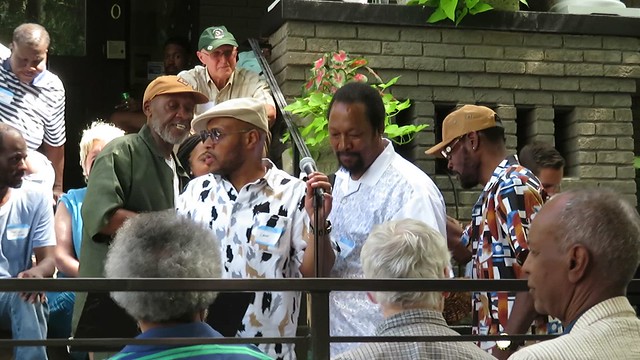
Wudel was one of the first people he encountered at Joseph’s House, and Lang said he will hate to see her leave.
“She touched a lot of hearts,” he said.
Lang said living at Joseph’s House “saved my life.” Inspired by his time there, Lang is working hard to stay healthy, noting that he currently has an undetectable viral load — the amount of the virus in his body is low enough that his immune system keeps him from getting sick, and there is effectively no risk of sexual transmission of the virus, according to the Centers for Disease Control and Prevention.
He now visits Joseph’s House every day or every other day to share a meal and catch up with friends. Lang describes it as a place with a lot of love — and food that is “out of this world.”
[Read more: Hospice for people experiencing homelessness celebrates life with #DragBrunch]
Robert Ramsey, another former resident of Joseph’s House who has HIV, also stops by Joseph’s House frequently to visit.
“You’re always welcome,” Ramsey said. “It’s unconditional love.”
Spending several months at Joseph’s House gave Ramsey a “new life.” At one point during his stay, he had to be hospitalized after becoming extremely sick. When he woke up in the hospital, Wudel was at his bedside.
“She’s been there for me when I needed her,” he said. “When she leaves here, it’s going to be like part of me is missing.”
Ramsey said that after about 25 years of experiencing homelessness, he thanks God, Wudel, and the staff at Joseph’s House for the fact that he is now drug-free and has his own place to live. He said the best part of his time at Joseph’s House was being reunited with his family — including his seven children — after 18 years.
Welcoming a new leader
As Kowshara Thomas undertakes the transition from nurse to executive director, Wudel said she’s leaving her “true love” — Joseph’s House — in good hands. It was her confidence in Thomas’s ability to keep things running smoothly that made Wudel comfortable with her need to depart.
“[Kowshara] was such a capable nurse, such a compassionate teacher, such a healer by her spirit, and a natural born leader,” Wudel said.
David Hilfiker, the founder of Joseph’s House, addressed Thomas during the June 15 celebration. Hilfiker said Thomas has “big shoes to fill” as she takes the reins. But he said he expects Thomas to bring her own vision for Joseph’s House to “create something new” as the group’s leader.

Thomas said she feels fortunate to work at Joseph’s House and looks forward to the staff and residents of Joseph’s House continuing to work together as a community, providing quality care through hospitality and spiritual companionship.
“As a leader we are always facing challenges. The biggest challenge is how to be a great leader,” Thomas said at the celebration. “I will embrace these challenges with no fear, because I know firsthand that the love we give is from the heart. It shows in our relationships; it shows in our community; it shows in our workplace.”
A legacy of service
Scott Sanders, the deputy director of Joseph’s House, said Wudel built a community at Joseph’s House during her 29 years there that reflects what the world would look like if “love” and “radical hospitality” were at the center of everyday life.
“Under Patty’s guiding light, hundreds of people found healing — some healing into life, and others healing into death,” he said.
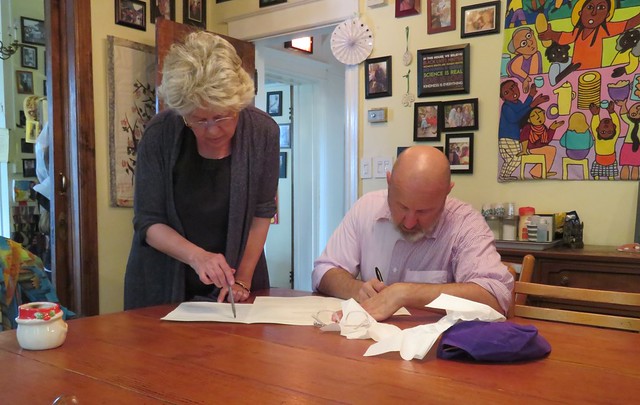 Outgoing Executive Director Patty Wudel and Deputy Director Scott Sanders. Photo by Ken Martin
Outgoing Executive Director Patty Wudel and Deputy Director Scott Sanders. Photo by Ken Martin
Board president William Burns said he has always been amazed by Wudel’s energy and her optimism, even amid great challenges.
“While Patty can move from this neighborhood, she will never be absent from it,” Burns said. “Her spirit and all she has contributed for so long will remain as reminders of how we ought to continue to live each day, how we are to serve each new resident, and how we are to welcome each person who finds their way to Joseph’s House for whatever reason draws them here.”
Burns said the fact that so many volunteers return to Joseph’s House year after year is a testament to the impact that Wudel has had on the Joseph’s House community.
Community becomes family
Working at Joseph’s House is like joining a family, according to longtime volunteers.
Helen Tanay, a veteran of about 20 years, said she enjoys the companionship and community that is felt by residents and volunteers alike. “Everyone does their part,” she said.
During her tenure, Tanay said, Joseph’s House has transitioned from admitting only men as residents to admitting women as well. She added that Joseph’s House has also moved toward providing more respite care — planned or emergency medical assistance that is temporary — while continuing to offer hospice care for those at the end of their life.
Another change over the past decade has been the source of funding — about $1.4 million in 2018, according to Guidestar. Joseph’s House received 75 percent of its budget from government grants and contributions until 2009. Following the recession, government assistance for the nonprofit shrunk to support about half of the organization’s expenses, which still held true in 2018.
As a result, the nonprofit’s leaders had to turn to foundation grants and individual donations to cover expenses, and they continue to push private fundraising efforts.
[Read more: As living with HIV becomes more common, affordable housing remains out of reach for many seniors]
That hasn’t diminished the focus on community-building. Heidi Mills, a volunteer who started in August 2018, said the volunteers at Joseph’s House are cared for just as much as the residents.
“This place over a short amount of time has become a second family,” Mills said. “I’ve learned so much about myself, like what it means to engage with people that I might not have ever interacted with.”
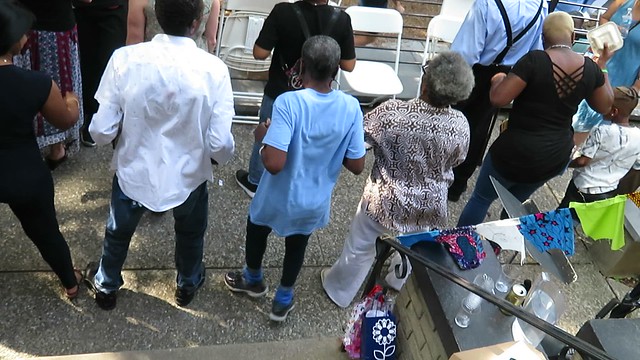
Mills said activities like a daily communal breakfast where residents and staff talk about their days — as well as community outings to places like the National Zoo each week — make Joseph’s House feel like home.
She plans on continuing on at Joseph’s House for at least the next year. Mills said it will be important to have staff members who are familiar with the house and its procedures during this period of transition.
Akanksha Nalatwad, another volunteer who started in August 2018, said she has assembled an “entire family” since moving to D.C. by working at Joseph’s House. She noted the plethora of photographs of former residents displayed throughout the house, saying the pictures — which depict those who died as well as those who were able to move into their homes — help current staff and residents remember and honor people who were like their own family.
“These pictures are a really great way for us to remember all of the memories of people who lived here — it’s a huge part of this house,” Nalatwad said.
Gratitude from the city
The sense of community extends beyond those who live and work at Joseph’s House. Ward 1 Councilmember Brianne Nadeau said she sees the Adams Morgan neighborhood as lucky to host a refuge where people who have nowhere else to go can find “love and healing.”
Few places in D.C. provide the services available at Joseph’s House, making it an important resource, Nadeau said.
At the celebration, she recalled Wudel’s warm welcome when Nadeau first became the Ward 1 representative. It included an invitation to share a meal at Joseph’s House, where she felt “enveloped” by love and warmth.
“We are going to miss Patty tremendously,” Nadeau said in an interview. “It was a real turning point when she came on full-time and eventually became director, and everything about this place has Patty’s touch.”
At the ceremony, Nadeau — who says she feels privileged to have Joseph’s House in her ward — presented Wudel with a farewell letter.
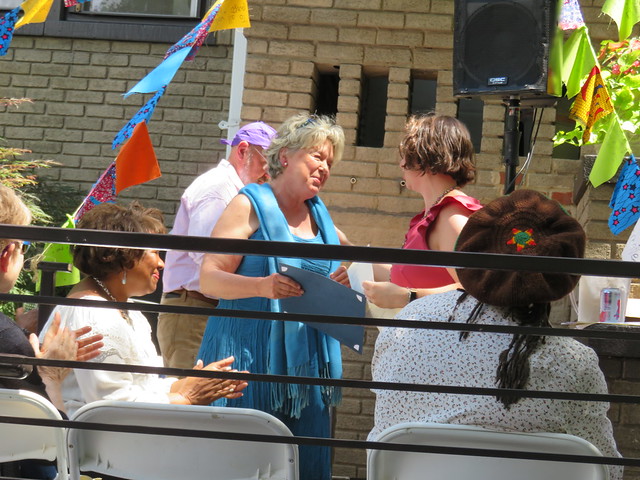
“Thank you for your many years of providing care for our neighbors who had fallen on tough times,” the letter reads. “Your work helping others is an inspiration to many and your leadership has meant countless neighbors remain so connected and dedicated to Joseph’s House that they know it as their home.”
For her part, Wudel said she hopes to see Joseph’s House nurture its spirit and remain a “real home” as well as a place to get quality care after she leaves.
“I still can’t quite understand how I got to be so blessed — for every lesson, every moment, every heartbreak,” Wudel said.
This article was co-published with TheDCLine.org.
